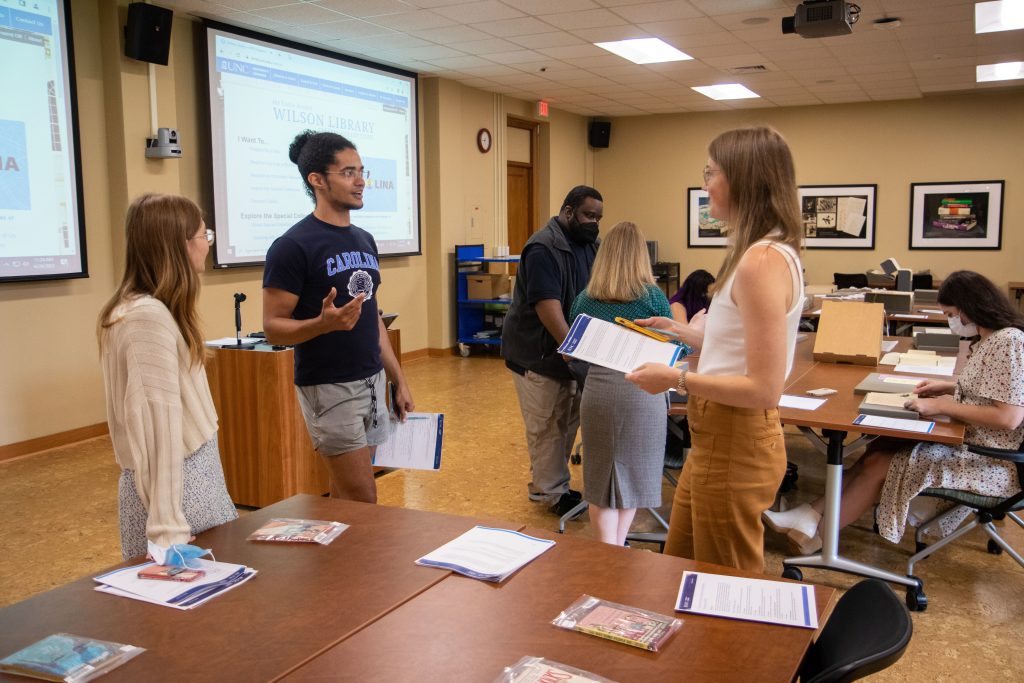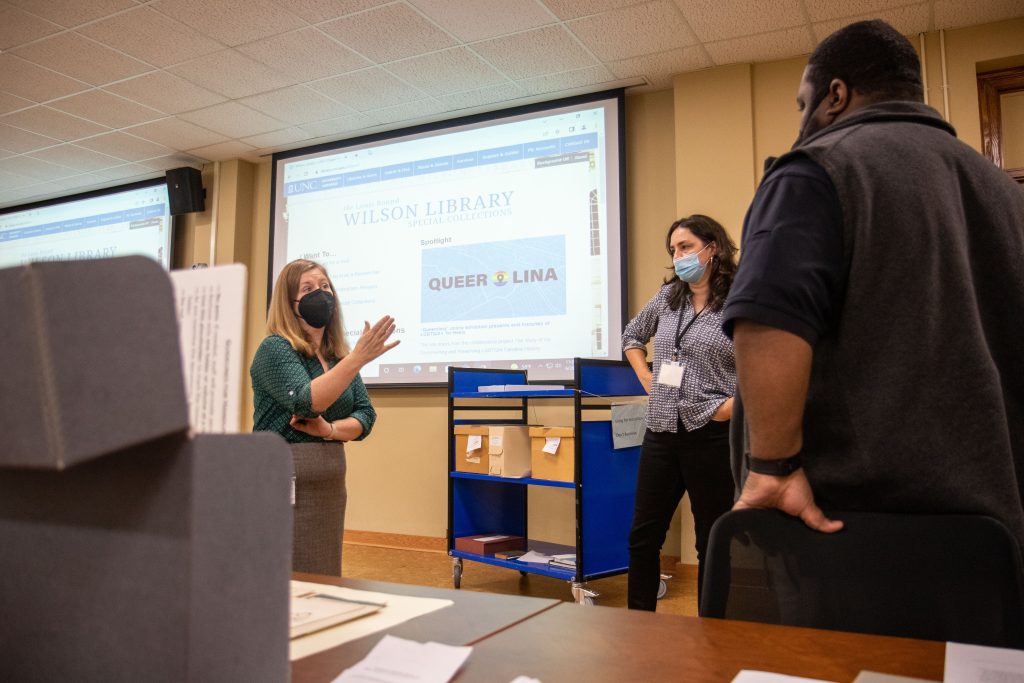
The University Libraries will welcome its second cohort of Primary Sources Teaching Fellows to the Wilson Special Collections Library in June. As year two of the program begins, instructors and fellows from the inaugural class reflect on the program’s impact during its first year.
The program’s goal is simple but important. With funding from the IMLS 21st Century Librarian Program, the Primary Sources Teaching Fellowship trains a new generation of librarians and archivists to teach with primary sources. Fellows are selected from Master of Library and Information Sciences programs across North Carolina based on their interest in and experience with using primary sources in the classroom.
“The ability to interpret a document and understand it in its historical context, and to discern who created it, for what audience, and for what purpose, is a vital skill,” says Emily Kader, director of the fellowship. “Primary source literacy helps us understand the world around us, and our fellows will go on to work with populations across the state and beyond to pass on this skill. Historical primary sources also invigorate learning and get students excited about their subject matter, so it really is a wonderful thing to make available to more people through teaching and learning.”

Primary Sources Teaching Fellows visit Wilson Library on June 29, 2022 as part of a three-day workshop where they crafted lesson plans around primary source objects from Wilson Library’s collections.

Emily Kader, Associate Curator for Rare Book Collection, Sarah Carrier, NC Research and Instructional Librarian, and a Primary Sources Teaching Fellow discuss collection in Wilson Library on June 29, 2022 during a three-day Teaching Fellow workshop.
The 2022 Primary Sources Teaching Fellowship included a six-week curriculum followed by internship placements for the fellows. The fellows spent the first five weeks in an online learning program, where they met twice a week to discuss readings and topics relating to teaching with primary source objects. Sarah Carrier, one of the instructors, helped develop the curriculum. She describes the experience of working with the fellows over the course of the program:
“Teaching the fellows was a rich experience for me. Each fellow came from a different institution and discipline – it was a varied group. So, each brought their own background and priorities to the group’s discussion and learning. We ran the learning session like a graduate seminar, heavily based in discussion centered on weekly topics. The discussion of scholarship and the participation in lectures took place online, which was appropriate, and necessarily the culmination working with collection materials happened in person. This lent a variety to both the teaching and learning experience.”
From June 29-July 1, the eight fellows from four of North Carolina’s master’s in library science programs came together at Wilson Library for a three-day in-person workshop. During their visit, they spent the first two days delving into materials at Wilson Library and crafting a lesson plan for learners of their choice. On the third day, the fellows presented their work to UNC-Chapel Hill librarians.
One fellow, Donte’ Perry, enrolled at North Carolina Central University, designed a lesson plan for culinary arts students using historic recipes and menus. Another fellow, Arai Greenwell-McAnsh, enrolled at Appalachian State University, designed an activity for third graders relating to the Wright brothers that included reading telegraph messages and newspaper accounts, examining historical photographs, and completing a coloring activity.
Carrier believes that librarians should be bringing education with primary sources to learners everywhere. “Primary source literacy must be taught outside of the academy – and outside of higher education,” Carrier explains. “Engaging with primary sources forges critical information and literacy skills necessary for every level of education, K-12 but also post-collegiate. Working with primary sources is not prescribed, meaning that sometimes the source answers questions, but oftentimes, the source poses more questions. Not everything has been examined by scholars. This means that there are a lot of possibilities and opportunities in working with primary sources, but librarians and teachers need to give guidance for how to find, understand, and use primary sources successfully.” The in-person workshop brought future librarians from across the UNC system to learn these methods.
According to fellows, the special thing about this in-person workshop was the hands-on experience with primary sources. Michelle Wolfson is one of the 2022 fellows enrolled at East Carolina University. “The main challenge for me was that I had not worked in special collections, archives, a university library — any way you want to frame it, I was new to it,” she explains. “To sit with actual primary sources and consider how to make a lesson plan around a primary source of my choice felt overwhelming at first, and I wondered if I could get it done in 3 days (well, 2 days, really, since we presented on the third day), and I was blown away that I did it!” With support and feedback from librarians in the field as well as each other, all the fellows met the challenge of producing lesson plans and teaching concepts.
Sophie Hollis is another of last year’s fellows, enrolled at UNC-Chapel Hill. “Something that surprised me about the fellowship was how differently each of us approached the instructional component, and I think that helped broaden my understanding of what ‘good teaching’ looks like,” says Sophie. “I think our collection of final presentations reinforced the idea that there isn’t a right way to engage learners with special collections — in fact, we need many ways of teaching to make space for many kinds of learners. I know that’s something I will carry forward as I step into new classrooms.”
The aim of the fellowship is not only to create a new generation of librarians trained to teach with primary sources but for them to teach primary source literacy to learners who haven’t been exposed to special collections materials before.
The 2023 Primary Sources Teaching Fellows started their training last week and will come to Wilson Special Collections Library this summer. The program is funded through 2024.
Story by Emily Kader
Photos by Aleah Howell, University Libraries


